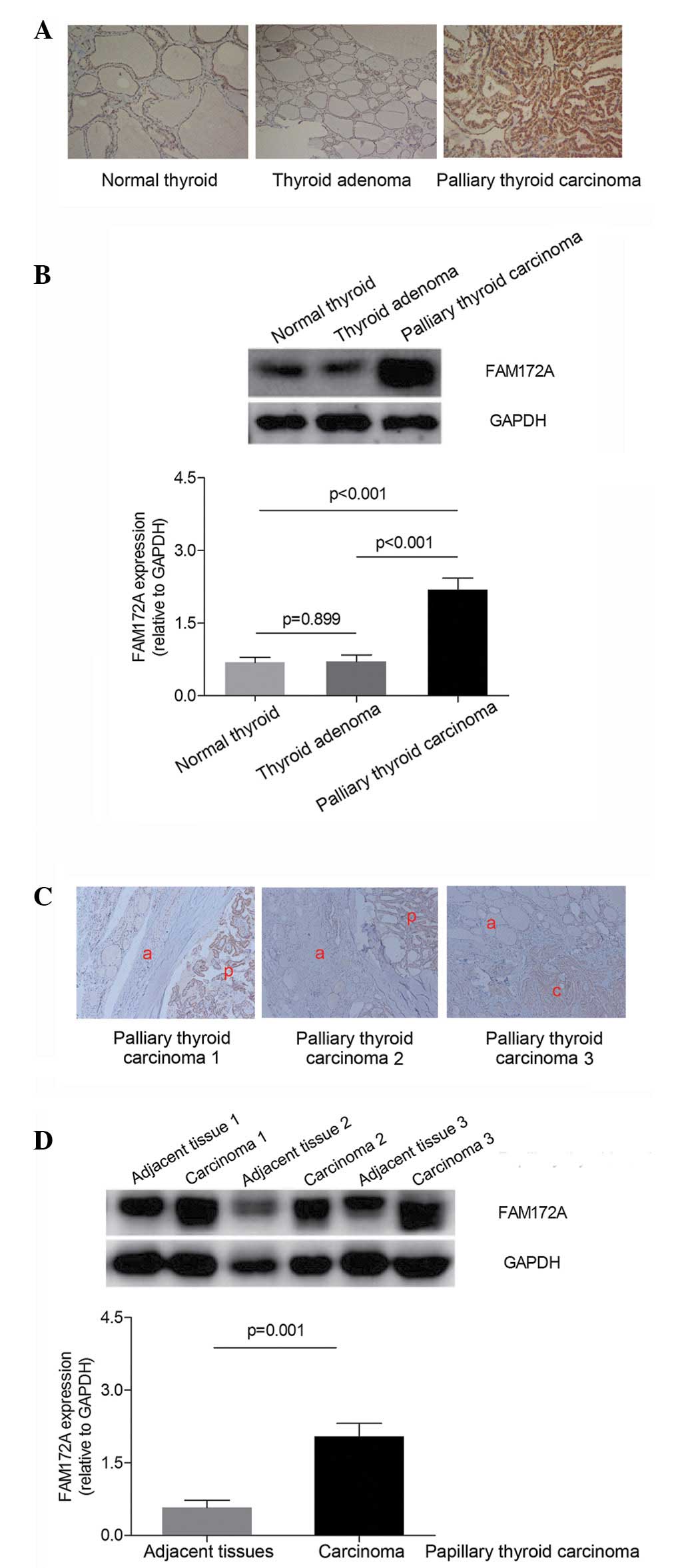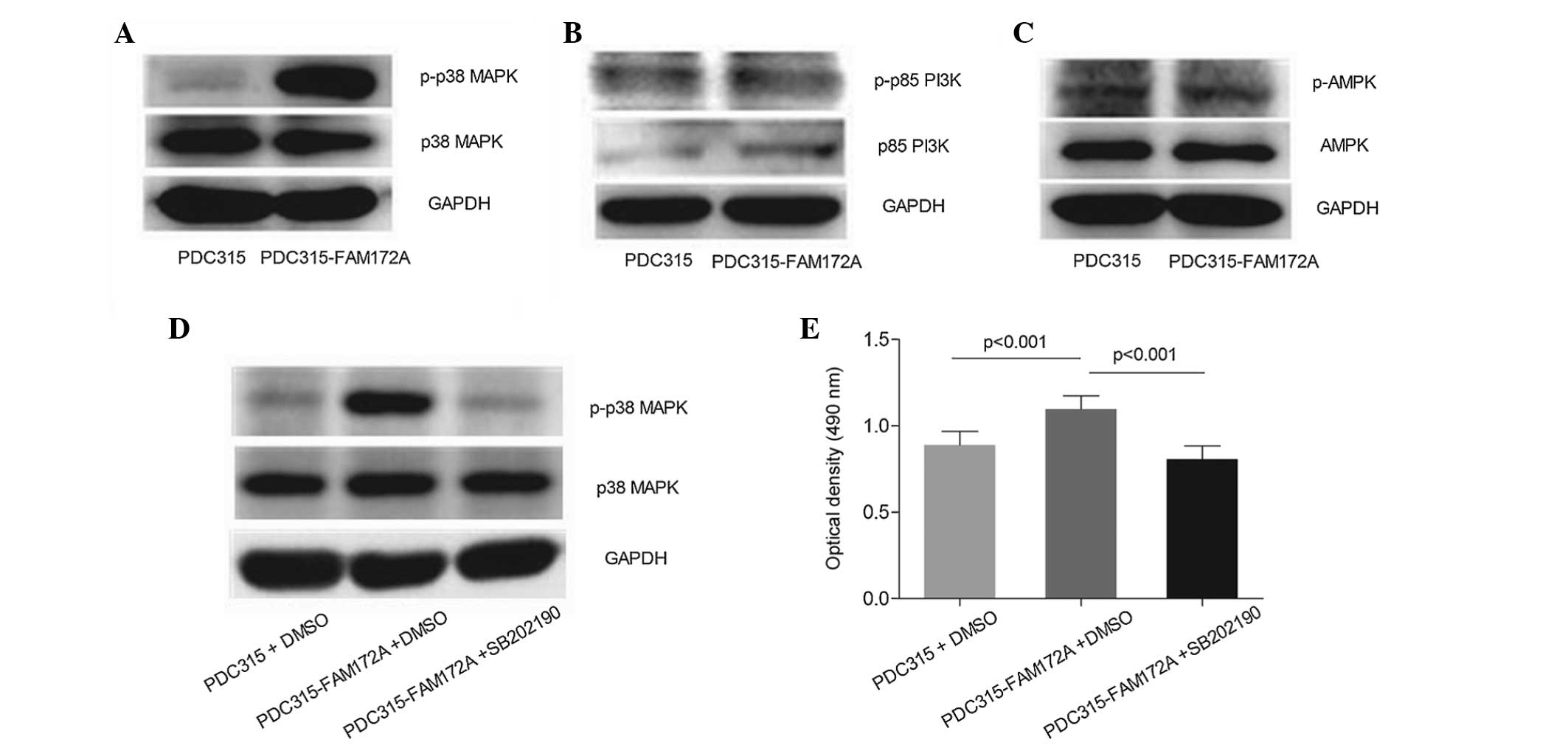|
1
|
Li LX, Zhou WB, Tao Z, Deng WJ, Liang WC,
Yang ZH, Ye WW, Bao YQ, Jia WP and Hu RM: Effect of FAM172A protein
on apoptosis and proliferation in HEK293 cells. Zhonghua Yi Xue Za
Zhi. 90:2424–2427. 2010.In Chinese. PubMed/NCBI
|
|
2
|
Li L, Dong X, Leong MC, Zhou W, Yang Z,
Chen F, Bao Y, Jia W and Hu R: Identification of the novel protein
FAM172A and its up-regulation by high glucose in human aortic
smooth muscle cells. Int J Mol Med. 26:483–490. 2010.PubMed/NCBI
|
|
3
|
Li LX, Tao Z, Dong XH, Liang WC, Yang ZH,
Mou B, Bao YQ, Wang C, Jia WP and Hu RM: Molecular cloning of a
novel gene, C5orf21 gene and its roles in diabetic macroangiopathy.
Zhonghua Yi Xue Za Zhi. 89:2574–2577. 2009.In Chinese.
|
|
4
|
Harding JL, Shaw JE, Peeters A, Cartensen
B and Magliano DJ: Cancer risk among people with type 1 and type 2
diabetes: Disentangling true associations, detection bias and
reverse causation. Diabetes Care. 38:734–735. 2015. View Article : Google Scholar : PubMed/NCBI
|
|
5
|
Ayturk S, Gursoy A, Kut A, Anil C, Nar A
and Tutuncu NB: Metabolic syndrome and its components are
associated with increased thyroid volume and nodule prevalence in a
mild-to-moderate iodine-deficient area. Eur J Endocrinol.
161:599–605. 2009. View Article : Google Scholar : PubMed/NCBI
|
|
6
|
Gursoy A: Rising thyroid cancer incidence
in the world might be related to insulin resistance. Med
Hypotheses. 74:35–36. 2010. View Article : Google Scholar
|
|
7
|
Bae MJ, Kim SS, Kim WJ, Yi YS, Jeon YK,
Kim BH, Lee BJ, Lee JC, Kim IJ, Wang SG and Kim YK: High prevalence
of papillary thyroid cancer in Korean women with insulin
resistance. Head Neck. 8: View Article : Google Scholar : 2014.
|
|
8
|
Guo K and Wang Z: Risk factors influencing
the recurrence of papillary thyroid carcinoma: A systematic review
and meta-analysis. Int J Clin Exp Pathol. 7:5393–5403.
2014.PubMed/NCBI
|
|
9
|
Li Y, Nakamura M and Kakudo K: Targeting
of the BRAF gene in papillary thyroid carcinoma (review). Oncol
Rep. 22:671–681. 2009.PubMed/NCBI
|
|
10
|
Krawczyk-Rusiecka K,
Wojciechowska-Durczyńska K, Cyniak-Magierska A, et al: COX-2
expression in papillary thyroid carcinoma (PTC) in cytological
material obtained by fine needle aspiration biopsy (FNAB). Thyroid
Res. 4:32011. View Article : Google Scholar : PubMed/NCBI
|
|
11
|
van Meerloo J, Kaspers GJ and Cloos J:
Cell sensitivity assays: The MTT assay. Methods Mol Biol.
731:237–245. 2011. View Article : Google Scholar
|
|
12
|
Lee SB, Li DQ, Tan DT, Meller DC and Tseng
SC: Suppression of TGF-beta signaling in both normal conjunctival
fibroblasts and pterygial body fibroblasts by amniotic membrane.
Curr Eye Res. 20:325–334. 2000. View Article : Google Scholar : PubMed/NCBI
|
|
13
|
Schlumberger MJ: Papillary and follicular
thyroid carcinoma. N Engl J Med. 338:297–306. 1998. View Article : Google Scholar : PubMed/NCBI
|
|
14
|
LiVolsi VA: Papillary thyroid carcinoma:
An update. Mod Pathol. 24(Suppl 2): S1–S9. 2011. View Article : Google Scholar : PubMed/NCBI
|
|
15
|
Siegel R, Naishadham D and Jemal A: Cancer
statistics, 2012. CA Cancer J Clin. 62:10–29. 2012. View Article : Google Scholar : PubMed/NCBI
|
|
16
|
Dal Maso L, Lise M, Zambon P, Falcini F,
Crocetti E, Serraino D, Cirilli C, Zanetti R, Vercelli M, Ferretti
S, et al: Incidence of thyroid cancer in Italy, 1991–2005: Time
trends and age-period-cohort effects. Ann Oncol. 22:957–963. 2011.
View Article : Google Scholar
|
|
17
|
Multanen M, Haapiainen R, Leppäniemi A,
Voutilainen P and Sivula A: The value of ultrasound-guided
fine-needle aspiration biopsy (FNAB) and frozen section examination
(FS) in the diagnosis of thyroid cancer. Ann Chir Gynaecol.
88:132–135. 1999.PubMed/NCBI
|
|
18
|
Naswa N, Sharma P, Suman Kc S, Lata S,
Kumar R, Malhotra A and Bal C: Prospective evaluation of
68Ga-DOTA-NOC PET-CT in patients with recurrent medullary thyroid
carcinoma: Comparison with 18F-FDG PET-CT. Nucl Med Commun.
33:766–774. 2012. View Article : Google Scholar : PubMed/NCBI
|
|
19
|
Joly DL, Feau N, Tanguay P and Hamelin RC:
Comparative analysis of secreted protein evolution using expressed
sequence tags from four poplar leaf rusts (Melampsora spp). BMC
Genomics. 11:4222010. View Article : Google Scholar
|
|
20
|
Evan GI and Vousden KH: Proliferation,
cell cycle and apoptosis in cancer. Nature. 411:342–348. 2001.
View Article : Google Scholar : PubMed/NCBI
|
|
21
|
López-Sáez JF, de la Torre C, Pincheira J
and Giménez-Martín G: Cell proliferation and cancer. Histol
Histopathol. 13:1197–1214. 1998.PubMed/NCBI
|
|
22
|
Qu JL, Qu XJ, Zhao MF, Teng YE, Zhang Y,
Hou KZ, Jiang YH, Yang XH and Liu YP: Gastric cancer exosomes
promote tumour cell proliferation through PI3K/Akt and MAPK/ERK
activation. Dig Liver Dis. 41:875–880. 2009. View Article : Google Scholar : PubMed/NCBI
|
|
23
|
Mihaylova MM and Shaw RJ: The AMPK
signalling pathway coordinates cell growth, autophagy and
metabolism. Nat Cell Biol. 13:1016–1023. 2011. View Article : Google Scholar : PubMed/NCBI
|
|
24
|
Hardwick JC, van den Brink GR, Offerhaus
GJ, van Deventer SJ and Peppelenbosch MP: NF-kappaB, p38 MAPK and
JNK are highly expressed and active in the stroma of human colonic
adenomatous polyps. Oncogene. 20:819–827. 2001. View Article : Google Scholar : PubMed/NCBI
|
|
25
|
Pomérance M, Quillard J, Chantoux F, Young
J and Blondeau JP: High-level expression, activation and
subcellular localization of p38-MAP kinase in thyroid neoplasms. J
Pathol. 209:298–306. 2006. View Article : Google Scholar
|
|
26
|
Huang XY, Wang HC, Yuan Z, Huang J and
Zheng Q: Norepinephrine stimulates pancreatic cancer cell
proliferation, migration and invasion via β-adrenergic
receptor-dependent activation of P38/MAPK pathway.
Hepatogastroenterology. 59:889–893. 2012.
|
|
27
|
Ayllón V and O'connor R: PBK/TOPK promotes
tumour cell proliferation through p38 MAPK activity and regulation
of the DNA damage response. Oncogene. 26:3451–3461. 2007.
View Article : Google Scholar
|
|
28
|
Gao B, Shi HL, Li X, Qiu SP, Wu H, Zhang
BB, Wu XJ and Wang ZT: P38 MAPK and ERK1/2 pathways are involved in
the pro-apoptotic effect of notoginsenoside Ft1 on human
neuroblastoma SH-SY5Y cells. Life Sci. 108:63–70. 2014. View Article : Google Scholar : PubMed/NCBI
|
|
29
|
Cuadrado A and Nebreda AR: Mechanisms and
functions of p38 MAPK signaling. Biochem J. 429:403–417. 2010.
View Article : Google Scholar : PubMed/NCBI
|

















